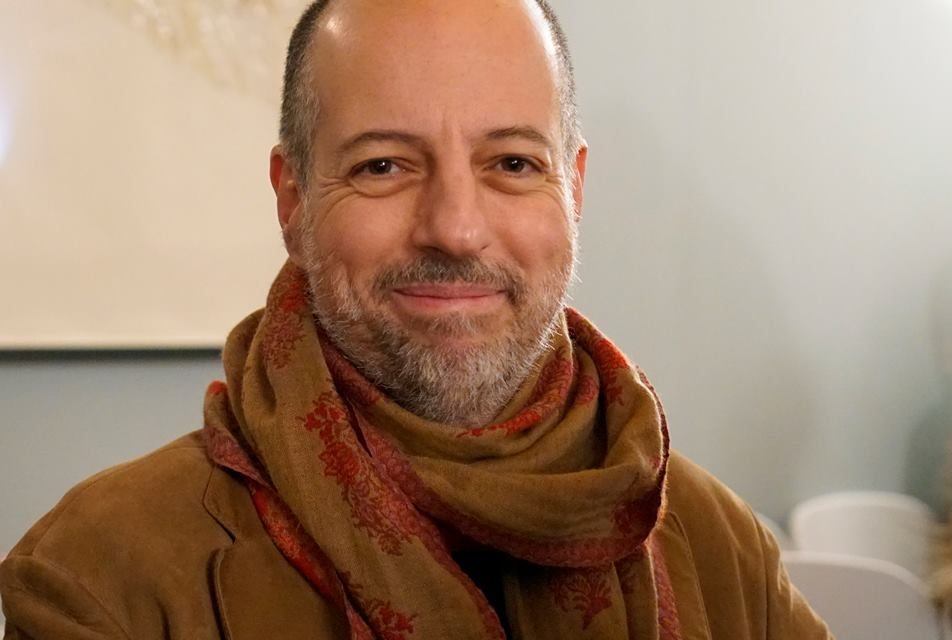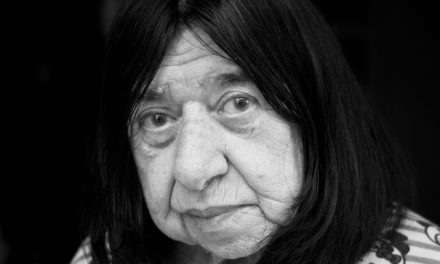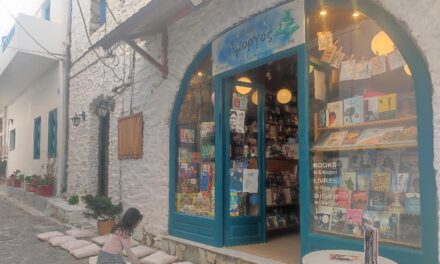Panayotis Ioannidis was born in 1967 in Athens, where he now lives. He has published three poetry books (all by Kastaniotis Editions): The lifesaver, 2008; Uncovered, 2013; Poland, 2016; a fourth, Rhinoceros, is forthcoming. His poems have appeared in two English-language anthologies, T. Chiotis’ Futures (Penned in the margins, 2015) and K. Van Dyck’s Austerity Measures (Penguin 2016; NYRB Books, 2017), two German ones, and several (Greek, English, Swedish, and Turkish) journals. He is poetry editor for the monthly “The Books’ Journal”; on the editorial board of the biannual journal for poetry, theory and the visual arts, “FRMK”; curates the monthly poetry readings, “Words (can) do it”; and translates English-language poetry (S. Heaney, R. Creeley, T. Gunn, D. Harsent, a.o.).
He has also collaborated with visual artists (e.g. at the 2nd Athens Biennale) and teaches poetry as creative writing to children (e.g. in educational programmes of the Onassis Foundation’s Cavafy Archive) and adults (at the British Council, Athens). His personal English-language blogs is called “Spring’s treefellers”. Some of his poems may be found in English translations online at “Greek Poetry Now!” and “poets.gr”.
Panayotis Ioannidis spoke to Reading Greece* about the main issues his poetry delves into, noting that his books were “strictly conceived as architectural and musical structures”, and that “irrespective of the quite different terms of birth of each book”, there is that “over-arching, almost obsessive quest to highlight, to ‘immortalise’ the moment through words”. Asked about his venture, “Words (can) do it”, he explains that it sprang from a twin root: “the firm belief in, and deep enjoyment of poetry as an art of sounds…requiring auditory presentation, and the conviction that poetry is best enjoyed straight…and from the source: the people who write it”.
He comments that “contemporary Greek poetry is currently flourishing: the increasing number of good poems published in journals is proof enough”, noting however that he would greatly “hesitate to equate a burgeoning of any art with an increased civic awareness’”, and adds that “successful ‘interweavings’ or collaborations between different arts…are rare – unless, of course, they result in, and obey a new art form: the theatre, for example, or opera”. He concludes that “the newer generations of Greek writers are generally quite conversant with other linguistic environments”. Yet, “how and to what extent this will result in better Greek writing, it would certainly be quite complicated, and is probably too early to assess”.
Which are the main issues your poetry delves into? Are there recurrent themes in your writings?
Whether due to my belief that the author’s view of her or his own work does not matter in the least –or matters as much as any reader’s– or simply out of an old-fashioned sense of decorum, I am generally, usually, reticent to speak about my own poems, and find the prospect rather ungraceful. However, since, in one of your other questions, you pick up on the element of a self-imposed wager in translation, I might as well accept this one too: to translate my own work of words into another set of my own words.
My first four books have been composed of poems that were written without a conscious plan in mind – which, however, does not make these books “collections”: they are strictly conceived, as architectural and musical structures. (Some poems they contain have had to wait for years before finding their appropriate place in a book; others never did). The first one, The lifesaver (Kastaniotis Editions, 2008), is principally a coming-of-age book: recollections and meditations on childhood, adolescence and early youth experiences culminate in a tripartite requiem for a loved person (who was also a poet). The book’s title is quite eloquent, I think, as to its intentions: how much of life can poems salvage and redeem? Is there any substance in the hope that poems might also work as life-saving devices?
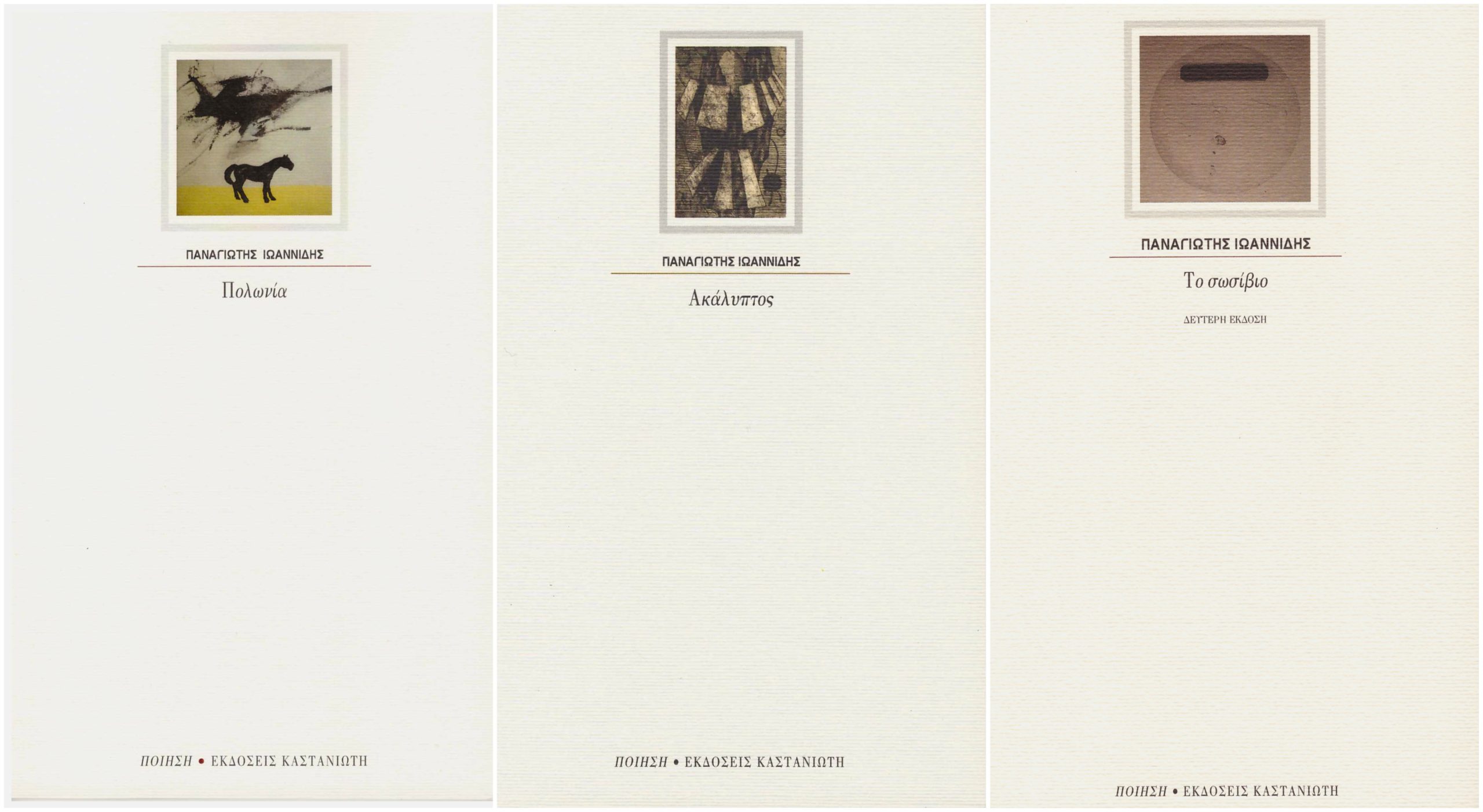 Poland: Artwork by Nikos Kryonidis, Uncovered: Engraving by Bedrich Glaser, The Lifesaver: Engraving by Monika Zawadzka
Poland: Artwork by Nikos Kryonidis, Uncovered: Engraving by Bedrich Glaser, The Lifesaver: Engraving by Monika Zawadzka
The second book –whose title I have tended to translate as Uncovered, but A.E. Stallings’ rendering as Unsheltered is equally interesting– also declares its intentions on the front cover: an opening up in, and –it seemed to me– a more daring approach to form, style and subject matter. Whereas the Lifesaver‘s poems had been chiselled –if not indeed sand-papered– over many years to the minutest (in my capacity) detail of word choice and position, in Uncovered (Kastaniotis Editions, 2013), I felt I was allowing myself a freer form, with phrases becoming more supple as well as the compositional unit instead of, previously, words; humour surfacing more evidently; etc.. A widening of the field (in the photographic as well as in the poetic sense) and a trying-out of different techniques, are some, I think, of its features. Vassilis Dioskouridis, editor extraordinaire, had pronounced it a book about a “fall”. I had found this opinion –as all his opinions– fascinating, but had not dared ask what he meant. Perhaps, though, this also fits the title and my thoughts when choosing it, since, in Greek, it is at once an adjective (as translated above), but also a noun denoting the back-yard of a tall building of flats: tiny, usually, on its own, but, when combined with that of other buildings on the same block, forming quite a large ‘neutral’ space, allowing surprising views of dull as well as unexpected moments, and forming a rather unusually spectacular interface between the private and the public. Equally, allowing various falls (from the surrounding balconies): of clothes, children’s toys, humans on occasion.
Poland (Kastaniotis Editions, 2016) arose to a large extent from, and is coloured overall by my love and study of Polish history and culture – which inevitably also means that of Europe beyond countries (such as Lithuania, Sweden, Germany and Russia, to name but four that appear in the book) with close historical ties to Poland. The book contains personal responses to historical and artistic moments, as well as enquiries into my own position with regard to the past and the present (Europe’s included). While I was finishing this book, it dawned on me that my interest in Poland (a country and people with surprising similarities to my own) may have been a response to the ‘Greek Crisis’, fuelling in me a hunger for History.
Formally, I feel it is closer to the tightly knit Lifesaver – whereas the upcoming, fourth book, Rhinoceros (Duehrer’s, not Ionesco’s), is, in this respect, a ‘second’ Uncovered. Even if Rhinoceros, too, did not start being written with a clear, or at least a conscious, intent, much like with Poland, I soon realised that it was crystallising around two obvious nuclei: the importance of art in, and for life; and death – which has nevertheless been stubbornly in the background, when not plainly in the foreground, of all my books, it seems to me. Art, not in its aesthetic role – but art as made of the selfsame flesh as life itself. (And I do mean “made” rather than “being”.) As if William Blake’s phrase “The Whole Business of Man is the Arts” were literally true – and the sheer fact of death, one of the reasons for its being true.
Nevertheless, it is becoming quite clear to me that, irrespective of the quite different terms of birth of each book, there are indeed recurrent themes in all four: animals, for example – many insects, but also birds, and mammals; music; not least, the over-arching, almost obsessive quest to highlight, to ‘immortalise’ the (humble or revelatory, though frequently the two coincide) moment through words. More often than not, this seems to me a vain attempt (which clearly makes me a recidivist). As vain, perhaps, as this attempt at describing my own work – which hopefully will not have drained it of all interest.
It would have been far easier –and briefer– for me to speak of my other writing: the essays (the first published one being an improvisation on a theme from an essay by G.K. Chesterton), or the pieces of criticism, which are always labours of love: from overviews of Zissimos Lorentzatos’ essays and Helias C. Papadimitrakopoulos’ short stories, to, in recent years, more or less extensive reviews of books by contemporary Greek poets.
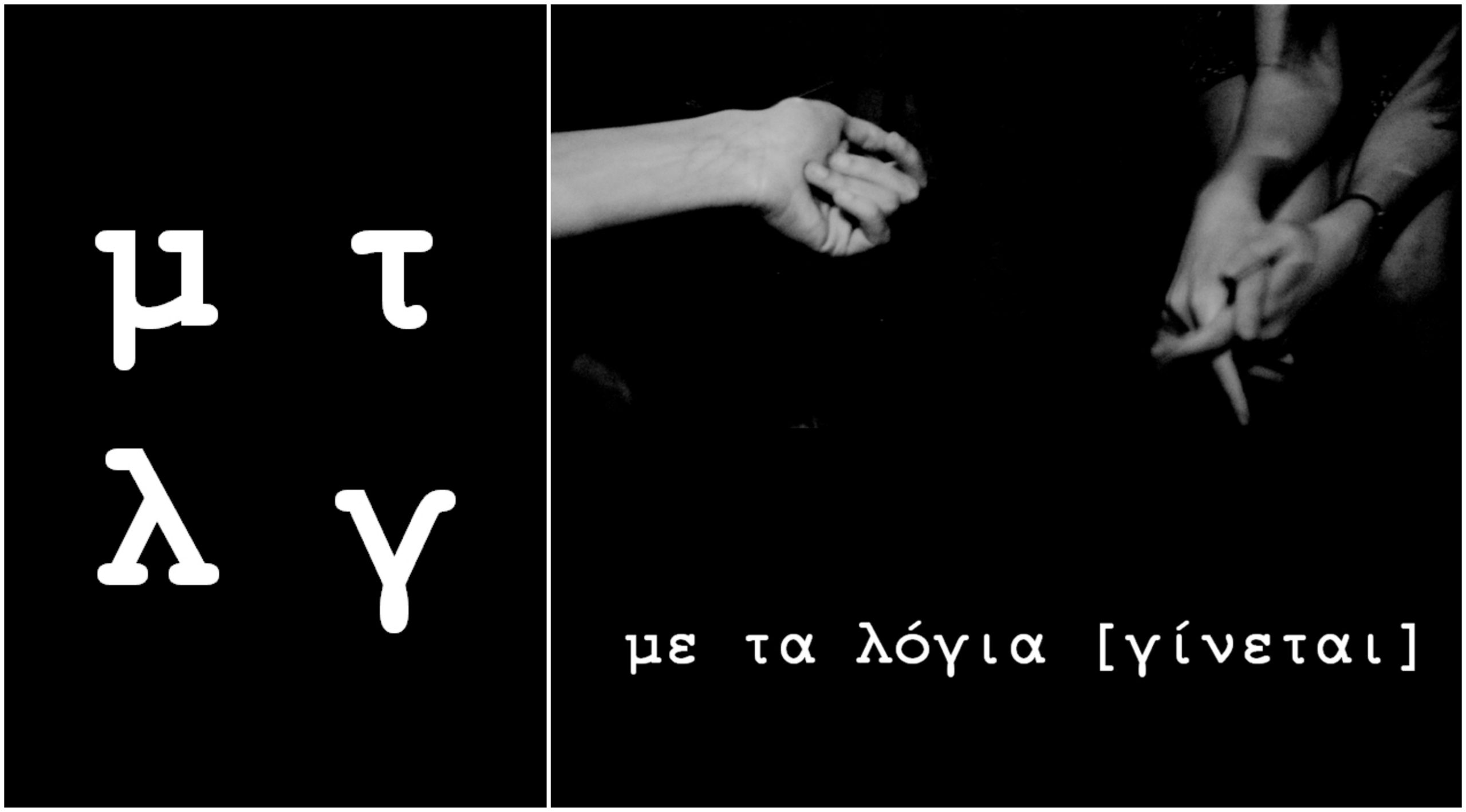 ©Panayotis Ioannidis
©Panayotis Ioannidis
In 2011 you founded “Words (can) do it”, which comprise not only readings by Greek poets of different generations but also readings of foreign poetry both in the original and its Greek translation. What’s the idea behind this venture?
“Words (can) do it” [Me ta loyia (yinetai); ‘mtlg’ for short] sprang, in December 2011, from a twin root. From the firm belief in, and deep enjoyment of poetry as an art of sounds, therefore not only suited to, but also requiring auditory presentation; and the conviction that poetry is best enjoyed straight –no music or other ‘accompaniments’– and from the source: the people who write it. There were, of course, predecessors and inspirations: the plain authors’ readings that are the rule in the English-speaking world where I have lived (as opposed to the Greek norm of critic- and journalist-heavy ‘book presentations’), and the small-group, workshop-like, “Contemporary Poetry Readings” that Yorgos Hantzis’ curated in Athens from 2006 to 2009, upstairs at the “Dasein” cafe.
I felt that there was both reason and space to combine the two approaches: to allow poets and poetry translators to read from, and talk about their own work – in the presence of the widest possible general audience. And I like to think that ‘mtlg”s itinerary so far, as well as its attendance scores, vindicate the conviction that poetry, like any art, may be deeply enjoyed by anyone who is willing to dedicate a little of their time to concentrate on what they hear, in a space and conditions (ideally offered since 2012 by the Hellenic American Union) that allow and encourage it.
It is each time a great pleasure and a considerable honour to dream up –as a match-maker of sorts– appropriate pairs of poets and invite them to present their poetic ‘self-portraits’. And it would seem that some of the matches have been a pleasant, unexpected and fruitful surprise to poets and audience alike. In addition, ‘mtlg’ has provided the ground and occasion, again both for poets and audiences, to study anew, revisit and re-appraise Greek poets of the past, along two directions. On the one hand, poets who may not have, in the current discourse and readership, the prominence they deserve (such as Takis Papatsonis, Eleni Vakalo, Zoe Karelli); and, on the other, well-known poets but from a slanted viewpoint: Cavafy beyond the ‘canon’ of 154 poems; Karyotakis with, rather than above, his contemporaries; or events where contemporary poets render an homage to older poets through especially written poems ‘inspired by’ them; for example, by Andreas Kalvos or Nikos Engonopoulos.
The insistence that, for our March “Poetry Month” events focused on American poets, poet-translators, rather than (however excellent) translators who are not poets themselves, produce and read –alongside the originals read by native speakers– fresh translations (so far: of E. Dickinson, W.C. Williams, R. Frost, E. Pound, M. Moore, E. Bishop, R. Duncan), is founded on the knowledge that poets are best placed to understand the mechanism inside each poem, and therefore more able to render it into their own language. In addition, our other foreign poetry events that are dedicated to translators’ self-portraits, and where poems are also read in the original (again, to honour the importance of poetry’s sound structure), have showcased important work written in French, German, Italian, Polish, Russian, Spanish, Swedish, as well as Ancient Greek, and English.
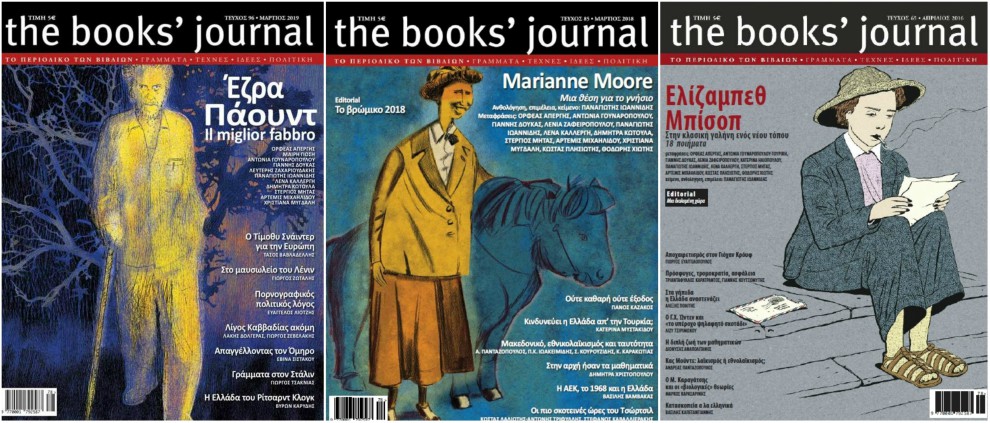 ©Alecos Papadatos
©Alecos Papadatos
I trust that all of the above has rendered abundantly clear how much ‘mtlg’ is a communal project, whose success relies on the contributions of a scrupulously selected but continuously enriched circle of talented and hard-working poets. As for its audience, this is further expanded through the publication of the translations of American poetry and of other homages in the monthly “The Books’ Journal”.
You are also an editorial board member of “FRMK”, a literary magazine aiming to explore the poetic phenomenon in its entirety. What differentiates FRMK from similar magazines?
When “FRMK”’s editor in chief, Katerina Iliopoulou, invited me to join its founding editorial board, I was only too happy to become a member of a fellowship of poets and translators whose work I esteem. As K.I. has herself said on various occasions, “FRMK”’s individuality arises firstly from its scope: Greek poets born from 1960 onwards, foreign poets from the latter half of the 20th c. to this day; also theory and essays on art in general; and a thorough embracing of the visual arts – and secondly from its editorial approach, based on committed group work. The most spectacular, even for us who carried it out, evidence for, and result of this approach was issue 11: to all intents and purposes an anthology of 41 Greek poets through poems that engage with the political (and not simply with politics, current or otherwise, a slippery road to take, that seldom doesn’t result in fatal accidents), preceded by a substantial introduction presenting our principles, aims, methods, and overall view of the subject; and followed by several artists’ and theorists’ views. Both the anthology and its introduction were based on unanimous decisions: this obviously meant occasionally yielding to each other’s particular predilections, always within the limits already set by our mutual respect for each other’s very different work and outlook, coupled with our common commitment to (I would almost be tempted to say militancy for) the cause of poetry.
It is therefore a great pleasure to see “FRMK”’s audience grow steadily, in both numbers (buying our print issues and assisting at our various events) and loyalty – as well as to see our journal recognised by the State Literary Awards for 2016.
In recent years, there has been an extraordinary burgeoning of poetry in every form: graffiti, blogs, literary magazines, readings in public squares, to mention just a few. How is this strong civic awareness to be explained?
I agree that contemporary Greek poetry is currently flourishing: the increasing number of good poems published in journals is proof enough. However, I cannot entirely share this question’s view. Please allow me to note (a little aphoristically, by necessity, within the present compass) that not every text presented as poetry is necessarily worthy of this name. Similarly, not every mode of presentation, however ‘modern’, ‘innovative’, or “audience-friendly” it may appear, is suited to the enjoyment and appreciation of poetry. Equally, I would greatly hesitate to equate a burgeoning of any art with an increased “civic awareness”. Though making art and civic behaviour share obviously vehicles (humans), occasionally stances (ideas), and sometimes instruments (language), the relative weighting of these stances and the specific use of these instruments are clearly distinct and should be distinguished between the two fields. Using the aesthetic to serve politics or, conversely, allowing politics to direct the aesthetic, not only defeat the particular purposes and functions of art and politics alike, but more often than not quite nullify any effect either of them may have otherwise had. (A quick and easy indication of this statement’s truth appears once we remind ourselves that both these distortions have always been the hallmarks of absolutist regimes, regardless of hue.) I fear that these few severe-sounding statements must suffice within the limited space of this interview; my co-authors and I have treated this subject quite extensively in our collective book of essays A conversation about poetry now (FRMK Editions, 2018) as well as in the aforementioned introduction to issue 11 of “FRMK”.
Ηοw does poetry interweave with other artistic forms in the work of an increasing number of writers in recent years?
Again, this is an area that we have variously considered in A conversation about poetry now (FRMK Editions, 2018). Very briefly, I would say that artistically successful “interweavings” or collaborations between different arts (by the same or by more than one artists) are rare – unless, of course, they result in, and obey a new art form: the theatre, for example, or opera. The effort is nevertheless both tempting and, as you imply, trendy. Success depends on the breathing-together of the two art(ist)s, but ultimately requires the subjugation, however slight, of one art by the other. We may recall that great poetry has very rarely been set to music (at least to produce an important work of ‘song’). Similarly, in, say, an installation comprising of both visual art works and texts, it is the general physical, therefore primarily visual, aspect of the work that will carry it – otherwise, the work flatly falls to the state of a decorated reading room. There are however, it seems to me, two fields sown with fewer landmines: poetry in performance, in essence a modified, enriched, more variously inspired recitation; and poetry coupled to photography (or cinema), thanks to the two arts sharing a number of internal processes, and possibly also thanks to the apparently ‘mechanical’-‘objective’ aspect of the visual elements appearing complementary to, rather than repetitive of, or conflicting with the seemingly more ‘human’-‘subjective’ aspect of the spoken or printed word.
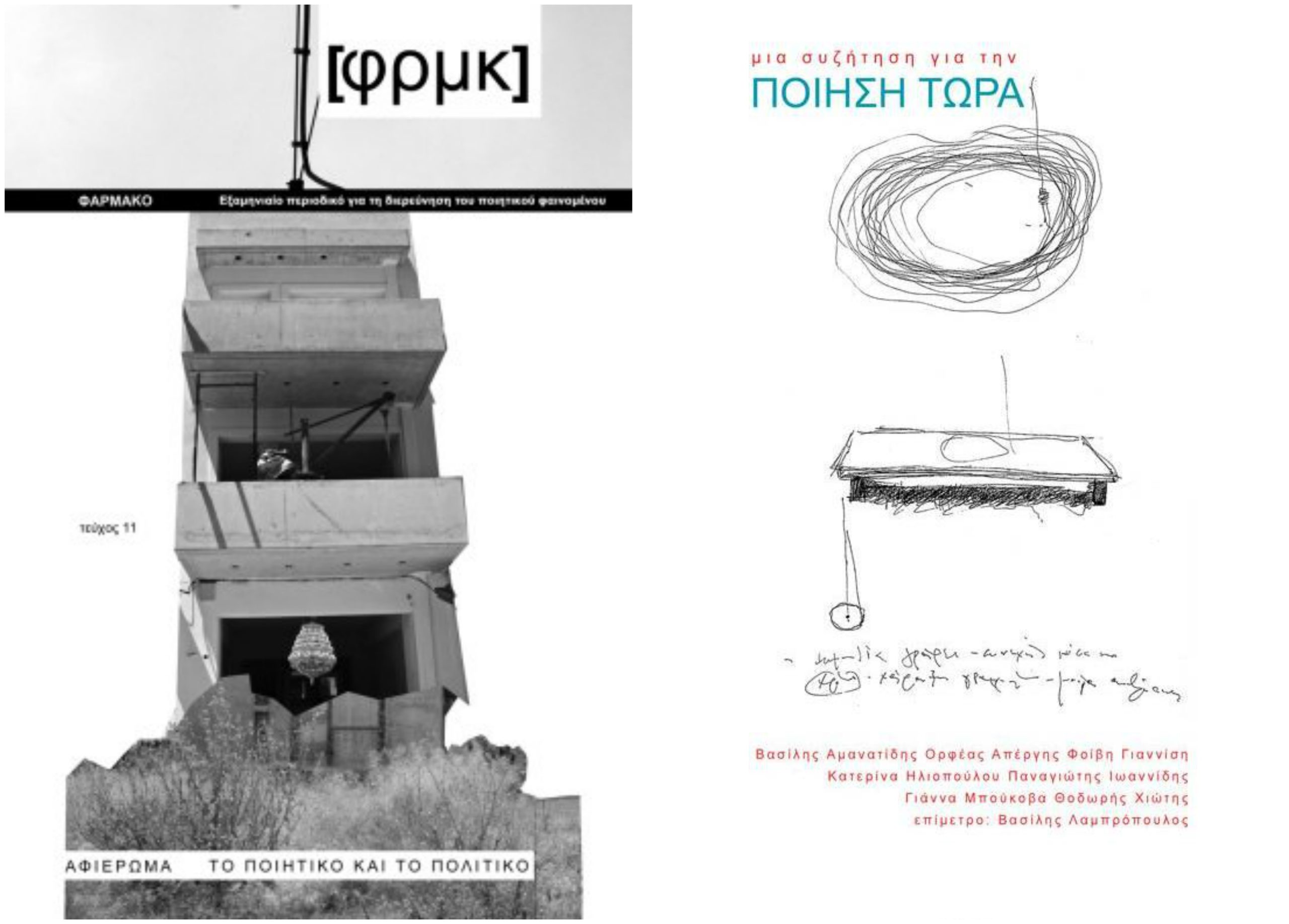 Cover by Yannis Isidorou Drawing by Vaggelis Artemis
Cover by Yannis Isidorou Drawing by Vaggelis Artemis
“I only translate poetry which, at the time, I so much like that I am willing to accept a wager”. Tell us more.
Well, as I said above, my criticism is always a labour of love. (I espouse Borges’ view that we should not spend any effort on negative criticism: we should do our best to talk about only works that we love and understand; perhaps the works that we don’t, will be better presented by people who do.) The same holds true of my translations: I only translate poems that I like – or, more often, love. From the first-published –in 1995, poems by Seamus Heaney to celebrate his award of the Nobel Prize– to everything that followed: substantial selections from Thom Gunn’s and Robert Creeley’s oeuvre; Andrew Motion’s masterful “Independence”; poems from David Harsent’s Night and Fire Songs and from A.E. Stallings’ Olives; a.o..
Due to the oral / aural dimension of poetry I have previously dwelt on, poems for me have a corporeality. Consequently, I experience the love for a poem as a wholly bodily sensation: not simply as intellectual enjoyment, but a much fuller one, where the senses have their due part. Now, love of this sort, eros if you like, is almost a hunger for assimilation, and may result in some kind of reproduction. Therefore, when I set out to translate a poem, it is because of the desire to assimilate it so completely within my linguistic self, that I might then be able to reproduce it in another language. To put it more prosaically, the “wager” consists of seeing whether the transposition to a new language can result in a poem that is also worth loving. Thus, when translating (or, more accurately, in the translations I end up publishing, since, inevitably, some attempts will, sadly, have been abortive), I try to give the new body of the poem, limbs of similar grace and moving in similar harmony to those of the loved prototype. In less fantastical terms, while the exact reproduction of line length, rhyme, alliteration and other ‘musical’ effects would be, if not impossible, certainly detrimental to the translation (only twins, and then rarely, can wear the exact same clothes and look good in them), it is both possible and desirable to invent and produce their analogues in the new language. (The same is also true of puns, for example, or idioms.)
But love operates in many directions – and my love of some Greek poems conquered my hesitation at not having been born and raised bilingual, when I accepted the kind invitation of Kiriakos Spirou, founding curator of Und.Athens – which consists of an exquisitely printed map of art spaces and a beautiful, constantly updated English-language site on contemporary Greek visual arts– to curate Und.Poetry, a monthly series of poems translated in English (usually by myself) and commented on, with the view of appealing to an audience whose primary interest is in another art form.
How does the new generation of writers relate to world literature? How does the local/national interweave with the global?
All great Greek poets –I believe, without exception– have been fluent in languages other than Greek, and engaged with literatures other than the Greek one (this is probably true for writers in every language). So, while it is imperative that writers should study their own tradition (after all, language is a writer’s material and instrument), it is also desirable, and welcome, that they should similarly study other traditions and follow the work of their contemporaries in other languages. This will be enriching at the very least; at best, it can prove transformative: a literal cross-fertilisation. And it seems to be true that the newer generations of Greek writers are generally quite conversant with other linguistic environments. How and to what extent this will result in better Greek writing, it would certainly be quite complicated, and is probably too early to assess.
*Interview by Athina Rossoglou
*INTRO IMAGE: © Themis Zafeiropoulos
TAGS: LITERATURE & BOOKS | READING GREECE

